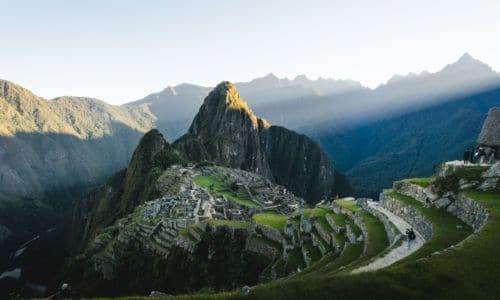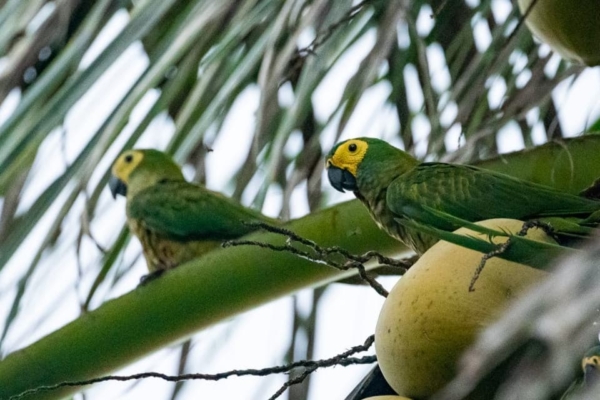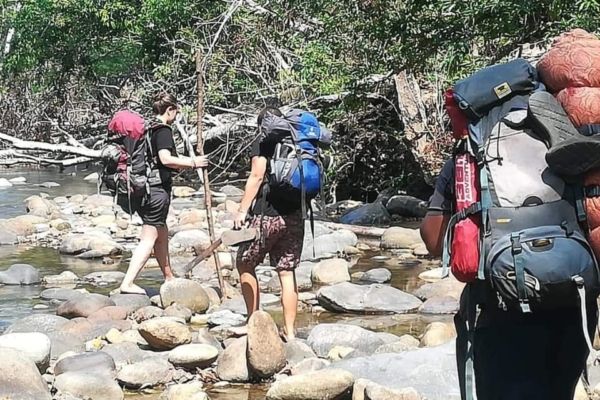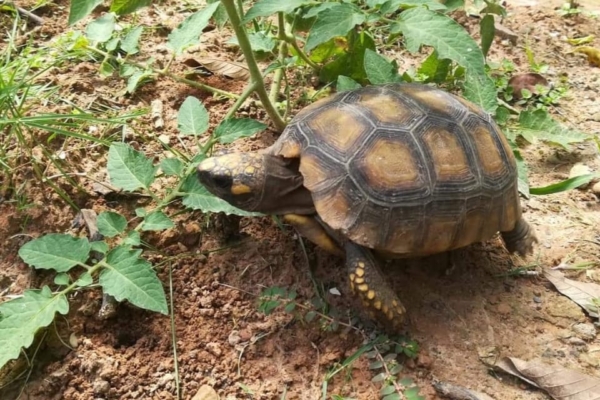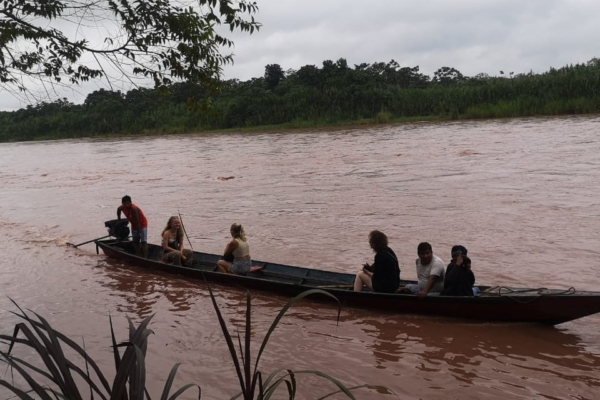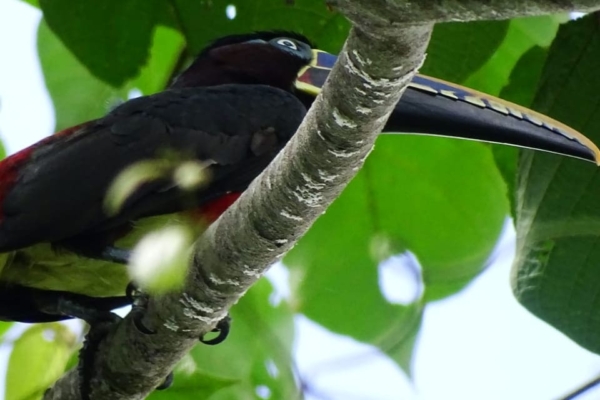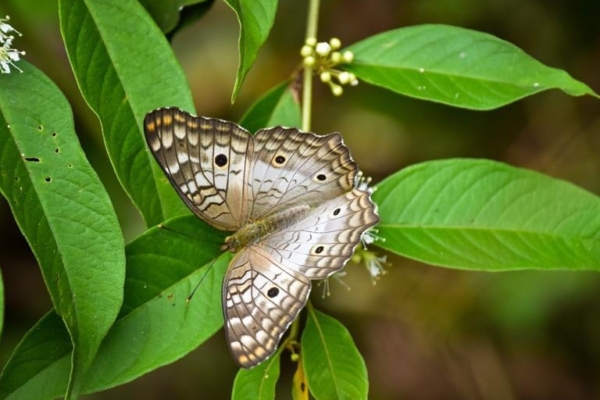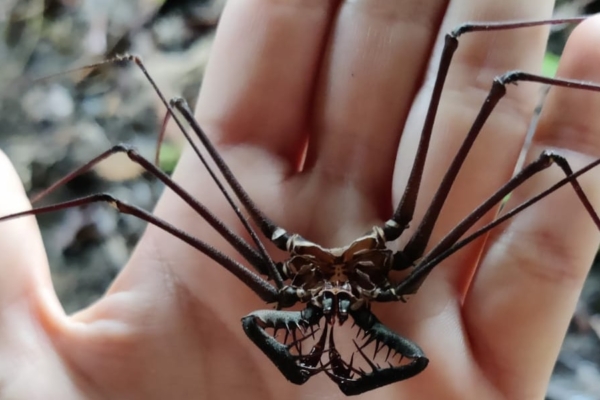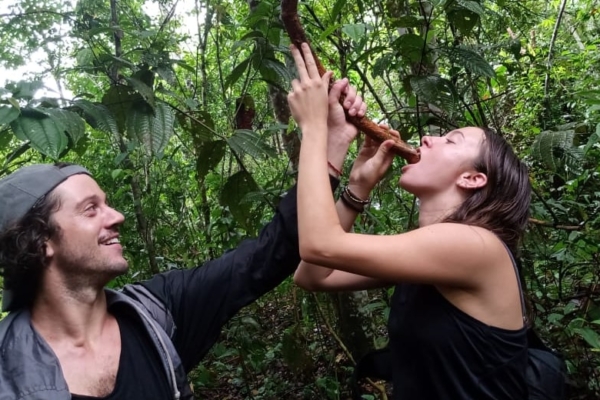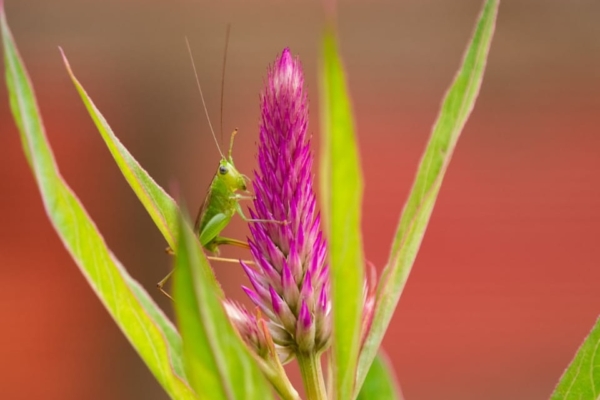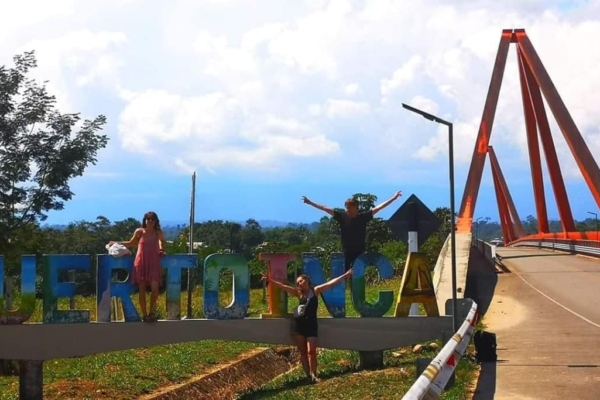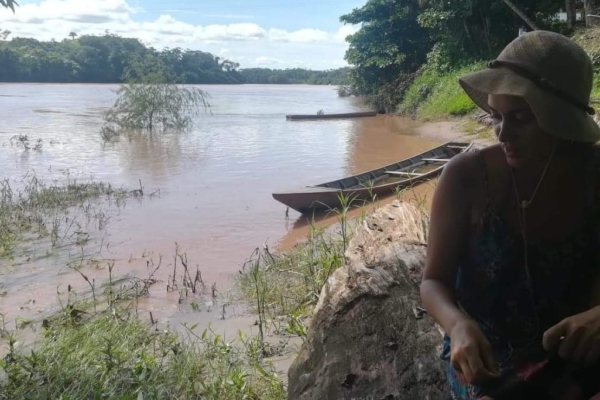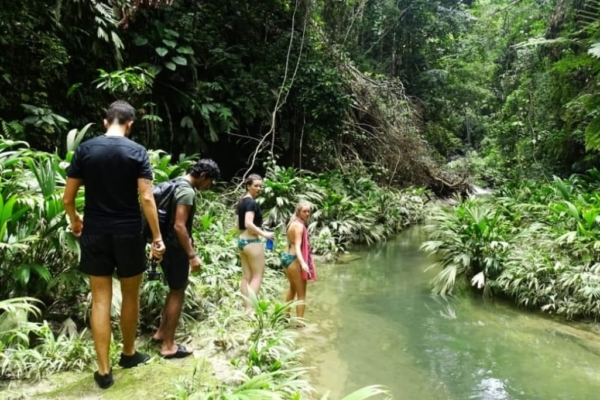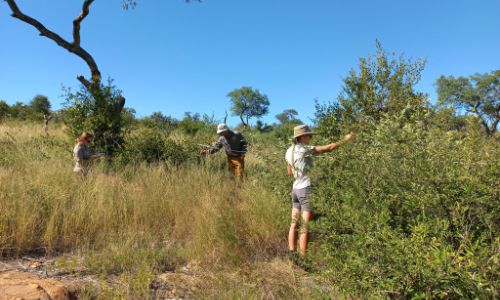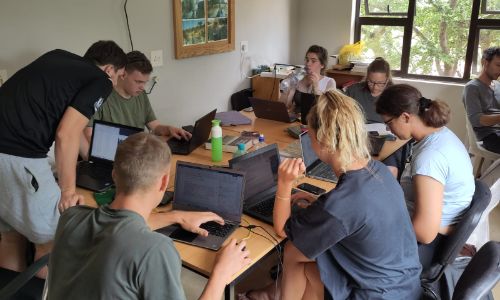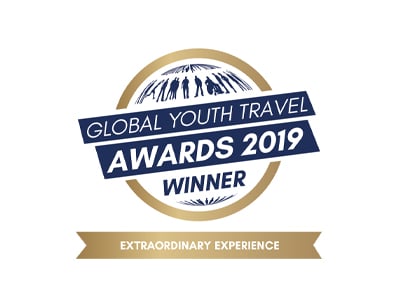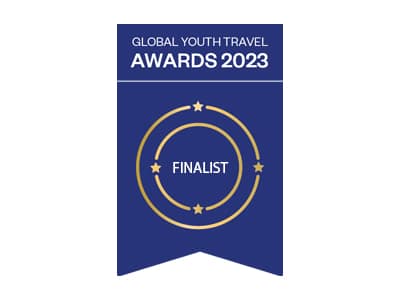Conservation Internship in Peru
PROGRAM OVERVIEW
Gain field experience documenting the flora and fauna of the Peruvian Amazon
This is an exciting opportunity for young conservationists eager to engage in fieldwork to monitor the animal and plant life of the Peruvian Amazon. You’ll live and work in the Codo del Pozuzo Regional Reserve helping to support conservation efforts through biodiversity monitoring, ecological documentation, and public education.
The Amazon conservation NGO you’ll be joining believes the best way to make enduring progress in rainforest conservation is by working with local communities to develop sustainable practices and create alternative job opportunities that don’t rely on destruction of the Amazon. As well as monitoring threatened species and their habitats, they document biodiversity and gather materials that can be used in educational programs.
As a conservation intern, you’ll work alongside biologists monitoring a variety of species. Workdays start with a tuk tuk or motorcycle ride from Codo del Pozuzo and a 1–2 hour trek to the sampling sites, offering early opportunities for sightings along the way. There, you’ll use camera traps and other wildlife observation methods to gather information on a variety of flora & fauna, including rare and endangered Amazonian species. Being a key conservation corridor with cloud forests and diverse ecosystems, this Conservation Internship in Peru is an opportunity to be at the center of grassroots conservation field work while connecting with local indigenous and Austro-German communities.
ORGANIZATION
This is a conservation-focused NGO based on the outskirts of the Peruvian Amazon working to protect the rainforest through youth empowerment and community development. They have a series of goals aimed to reduce poverty and drive sustainable development in the local region including improving education for children for the area, teaching English skills, and creating infrastructure for tourism. They believe that by building skills and creating new job opportunities, they can curtail activities that harm the rainforest and incentivize its conservation.
TASKS & REQUIreMENTS
As a conservation intern, you will assist the organization in monitoring physical and biological variables affecting the preservation of threatened species and protected habitats. This will give you opportunities to contribute to vital conservation data for fragile and prioritized ecosystems which will be shared on the iNaturalist website.
Field work shifts vary and you will be provided with a weekly schedule. You must be prepared for early start times (5-6am) or late nights (10pm-midnight).
Responsibilities
Your tasks will vary depending on the time of year, available tools, and your specific interests. These may include:
- Conducting field surveys on mammals, birds, reptiles, and plant life, documenting species diversity and abundance
- Monitoring habitats through systematic observations, taxonomic identification, and measurement of physical variables affecting ecosystems
- Seting, monitoring, and collecting camera traps, and documenting the presence of medium- and large-sized mammals using non-invasive methods such as footprint tracking and plaster molds
- Capturing photographic and video evidence of flora and fauna to support research and conservation awareness
- Using mobile applications and the iNaturalist platform to identify species, upload data, and strengthen technical conservation skills
- Carrying out nocturnal expeditions to expand knowledge of cryptic species, using acoustic recordings and direct observation of birds, amphibians, mammals, and arthropods
- Supporting environmental education and responsible tourism by guiding hikes, assisting on excursions to viewpoints and waterfalls, and promoting appreciation of natural heritage through digital tools
Requirements
- Must be studying towards or have completed a degree in biology, biotechnology, environmental studies, zoology, botany, or a related field
- Intermediate Spanish language skills
- A deep passion for conservation, specifically of the Amazon rainforest
- Strong communication skills – keeping in mind, there may be a language barrier at times
- Photography skills
- Survival and navigation skills
- Ideally first aid training and experience camping
- IMPORTANT: Willingness to live and work in challenging conditions of the rainforest – this is a physical internship that involves frequent trekking & camping
- REQUIRED: early start times (5-6am) or late nights (10pm-midnight)
WHERE YOU’LL STAY
Interns stay in one of the project’s cabins in Codo del Pozuzo, Puerto Inca. You’ll have basic amenities including showers, long drop compost toilets, a bed with a mosquito net, Wifi, and a kitchen where you can cook for yourself. You may also go out on field trips further away from the project base, where you can spend the night in a tent (bringing/purchasing your own tent is not a must, but recommended). This is very basic accommodation with limited resources, so this program is best suited for interns prepared for a more stripped back way of life.
Safety & Support
Safety & Support
Make sure to visit your doctor and dentist for a check-up before your internship and to get all the recommended vaccines and/or medications necessary to stay healthy. It is recommended to bring a portable water filter to ensure you have clean drinking water, particularly during trips to the jungle.
The on-site team will inform you of any safety guidelines regarding the area and any wildlife/insects to be mindful of. As a foreigner in any country, it’s important to be respectful of all cultures and local customs, avoid weary flashy clothing or jewelry, and never walk alone at night.
Communication
Communication
When you are in Puerto Inca, you will have access to Wifi, but be aware that there is no Internet or network access in the field. Please note that the Wifi in Puerto Inca can be unreliable – video calls are often possible, but streaming is not. It’s recommended to buy a local SIM card upon arrival, so ensure your phone is unlocked for international carriers.
Meals
Meals
Breakfast and lunch are included from Monday to Thursday. You will need to cook your own food during the evenings and Friday-Sunday or you can go out for a meal when in Puerto Inca. Local restaurants serve affordable meals consisting of an appetizer (soup or salad) and a main dish for less than USD 5. A soft fruit juice is often part of the menu as well. You can also go fruit picking as there are plenty of fruits around the village for free. It is recommended to purchase 20L bottles of drinking water from the shops.
Location details
Location details
You’ll be based in Codo del Pozuzo, Puerto Inca in the Huánuco region of Peru. This is an area of stunning natural beauty situated along the Sira Mountains in the Amazon Rainforest and bisected by the Pachitea River. The majority of the population lives off farming but deep within the jungle native communities still upholding their customs and traditions can be found too. As well as its extraordinary biodiversity, the area is famed for a number of geological and archaeological sites that you can visit during your internship.
DATES & RATES
Fee Breakdown
Internships begin on a Monday and it’s recommended to arrive on weekends, so you can explore Codo del Pozuzo before your official first day. Start and end dates are flexible and will be discussed with you during the selection process.
What you’ll pay (2026 rates)
4 weeks USD 2,727
6 weeks USD 3,501
8 weeks USD 4,138
12 weeks USD 5,037
16 weeks USD 5,789
20 weeks USD 6,551
Inclusions
- Careful matchmaking. It takes time to find the right internship for each person, and we take this process very seriously.
- Initial interview with one of our team to gauge your skills, interests, and desired learning outcomes.
- An academic internship eligible for university credit. Check with your university to confirm if this internship qualifies for credit or alternatively we can assist you with purchasing transfer credits.
- Shared accommodation in one of the huts in Puerto Inca with access to basic amenities and cooking facilities
- Breakfast & lunch from Monday to Thursday
- Spanish classes (4 hours per week) – extra classes can be booked at an additional fee
- Wifi access
- Transfer from/to the airport/bus station of Pucallpa (trip from Pucallpa to Puerto Inca takes approx. 5 hours)
- Activities: five trips to different spots in the rainforest including a camping trips, fruit picking, and an artisanal chocolate making workshop
- Guidance with your visa arrangement and other preparations
- Development of an Internship Work Plan to help you reach your learning goals
- Onboarding with your supervisor
- Regular check-ins
- Support from the Roots team remotely
- A certificate of completion at the end of your internship
- A reference letter upon request
Exclusions
- Flights to Pucallpa Airport
- Visa and medical/travel insurance costs for the duration of your placement – must include cover for repatriation
- Daily dinner and all meals Friday-Sunday
- Drinks, snacks, and items of personal nature (f.e. curios, gifts, clothing)
- Costs for additional excursions or activities
GALLERY
FAQs
Some of our most commonly asked questions for programs in Peru.
What can I expect from an internship in Peru?
You can expect to be in bustling cities or a completely remote jungle, depending on your internship of choice. Also, you’ll be collaborating with local professionals and volunteers that will offer you insights into Peruvian work ethics and practices. Beyond your internship, your weekends and free time can be spent discovering the overall breathtaking beauty of the country.
How will a nonprofit internship in Peru help my career development?
During your internship in Peru, you’ll be able to utilize your professional and personal skills, as well as develop those skills that you feel could use more work. Also, employers may see your CV as more favorable, since it’ll show that you were a part of a meaningful international grassroots project, which shows a variety of transferable qualities. If you want to know more about how doing a nonprofit internship is good for your career, make sure to check this blog out!
While on an internship in Peru can I receive university credit?
Yes, but you must check with your university supervisor that this experience qualifies. You can also buy additional transfer credits to add onto your internship.
Can I receive a stipend while completing my internship?
Unfortunately, no. You can find other ways to fund your internship as you will not be paid while working with a nonprofit organization. Your internship experience will bring a wealth of new knowledge, along with opportunities for professional and personal growth which are both invaluable!
QUICK FACTS
FEATURED REVIEW
HOW TO APPLY
If you’re ready to apply for this internship, here’s what to do:
APPLY
Fill in the application form (it will show in a new screen) which includes sharing your CV to us.
SPEAK WITH AN ADVISOR
We’ll set up a call with you to go through your application.
INTERNSHIP MATCHING
If we feel it’s a good match, we’ll set up a call between you and the supervisor for this internship.
PAYMENT
If everyone’s happy, we’ll provisionally confirm your placement! We’ll then send you the invoice for the deposit, getting started with the booking process and all the info you need.
CONFIRMATION
Only once we receive payment of the deposit your placement will be confirmed.
NEED TO MAKE AN ENQUIRY FIRST?
Or if you’d just like to ask us some questions about this internship first, just fill in the contact form below. We’ll be happy to assist!
"*" indicates required fields
RELATED PROGRAMS
Wildlife Monitoring & Conservation Internship
- Min. 2 weeks
- Maasai Mara, Kenya
- Wildlife Observation, Ecological Studies, Data Evaluation, Habitat Preservation
Bachelor’s Level Conservation Research Internship
- Min. 8 weeks
- Greater Kruger, South Africa
- Wildlife Research, Ecosystem Conservation, Data Collection
Master’s Level Conservation Research Internship
- Min. 3 months
- Greater Kruger, South Africa
- Ecological Research, Wildlife Conservation, Data Projects
RELATED BLOGS

